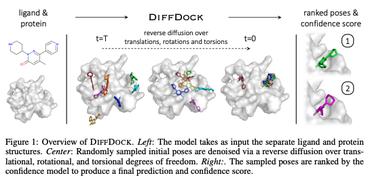Modeling Molecular Structures with Intrinsic Diffusion Models
Since its foundations, more than one hundred years ago, the field of structural biology has strived to understand and analyze the properties of molecules and their interactions by studying the structure that they take in 3D space. However, a fundamental challenge with this approach has been the dynamic nature of these particles, which forces us to model not a single but a whole distribution of structures for every molecular system. This thesis proposes Intrinsic Diffusion Modeling, a novel approach to this problem based on combining diffusion generative models with scientific knowledge about the flexibility of biological complexes. The knowledge of these degrees of freedom is translated into the definition of a manifold over which the diffusion process is defined. This manifold significantly reduces the dimensionality and increases the smoothness of the generation space allowing for significantly faster and more accurate generative processes. We demonstrate the effectiveness of this approach on two fundamental tasks at the basis of computational chemistry and biology: molecular conformer generation and molecular docking. In both tasks, we construct the first deep learning method to outperform traditional computational approaches achieving an unprecedented level of accuracy for scalable programs.
PDF Abstract

